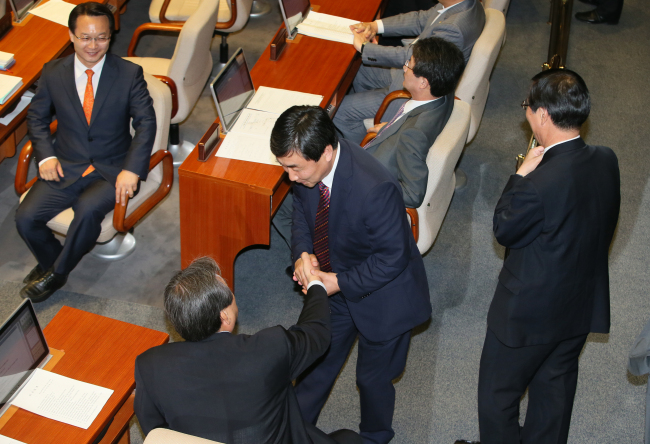Saenuri Party chief Kim Moo-sung on Monday apologized for causing public concern over a controversial parliamentary law as the ruling party sat out a revote of the bill vetoed by President Park Geun-hye last month.
The bill was automatically scrapped as lawmakers from the ruling Saenuri refused to take part in the vote at the plenary session, following the party platform established after Park’s condemnation of politicians attempting to challenge the government’s administrative power.
”I would like to offer my regret to the people that the revision to the National Assembly law was abrogated,“ Kim said during a recess of the session.
Political confusion persisted over the bill with rival parties locking horns over the “forcible” element it carried, he said, noting that the ruling party couldn’t help but to accept the president‘s veto.
 |
| New Politics Alliance for Democracy floor leader Rep. Lee Jong-kul (center) urges Saenuri Party chairman Rep. Kim Moo-sung (sitting) to cast his vote on the National Assembly Act revision at the plenary session Monday. Yonhap |
The remark came after National Assembly Speaker Chung Ui-hwa declared that the vote failed to meet the quorum of 149 lawmakers, with only 130 lawmakers attending.
The boycott of the revote prompted the main opposition New Politics Democratic Party to deride the ruling party for succumbing to pressure and abandoning the will of the people and their legislative authority.
Cheong Wa Dae hailed the parliament‘s decision that it, once again, confirmed the value of the Constitution.
Despite the ruling party’s decision that effectively discarded the bill, the latest hullaballoo appeared to have pushed the Saenuri Party and President Park to cross the Rubicon, with both losing momentum to restore their estranged relationship, experts said.
Cheong Wa Dae and the ruling party have been drifting apart with the party remaining divided over the fate of its floor leader Rep. Yoo Seong-min. The Saenuri whip has been resisting calls initiated by Park and her loyalists in the party to step down for not cooperating with her major state agenda.
The intensifying strife between Park and her party has so far resulted in a massive delay in her reform drive and also severely damaged her leadership in state affairs, even before she has reached the halfway point in her five-year term.
Piles of contentious bills needed to resolve urgent matters, such as a supplementary budget drafted to help the victims of Middle East respiratory syndrome, remain deadlocked at the parliament, alongside Park’s bill seeking to revive the nation’s sluggish economy. The communication channel between the government and the ruling party has been shut down since May, when the Saenuri Party made a legislative deal with the NPAD to pass a reform bill on the civil servants’ pension system in tandem with the revision to the Assembly law. The bill was to empower lawmakers to request a change in government decrees.
Park, who blasted politicians for pursuing their own political interests, has also been suffering from a severed relationship with the party leadership. The president keeping her distance from the Saenuri chief on Friday at the opening ceremony of the Gwangju Universiade Games clearly exposed her strained ties with the chairman, despite his repeated pledges that the party would work only for the success of her government. She appeared to have decided to wait until the party makes a decision on the fate of Yoo, whom she directly called a “betrayer” for publicly opposing a number of her state agenda items, including her controversial welfare expansion.
Despite Park’s denouncement and constant verbal threats from her loyalists, Yoo refrained from commenting on his fate Monday, a de facto deadline for him to make a final decision on his position.
Yoon Pyeong-joong, a political professor at Hanshin University, illustrated the internal feud between the pro-Park faction and a group of nonmainstream members including Yoo’s sympathizers as a power struggle between old and new conservatives who both feel an urgent need to transform the entire conservative bloc.
“Whatever Yoo decides of his fate, whether he would stay or quit as Saenuri’s floor leader, it won’t put an end to the ongoing conflict between Cheong Wa Dae and the Saenuri Party,” he said. “It would only lead to a second round of confrontations.”
The power struggle between the two factions lays bare Saenuri lawmakers’ insecurities that in the future they won’t be able to remain a mainstream political force if they don’t abandon the vision and political philosophy previously pursued by old conservatives like Park, he explained.
A growing number of voters, especially among those who consider themselves conservatives, are seen expressing disappointment with Park and her leadership over a series of crises involving the outbreak of Middle East respiratory syndrome and the sinking of the Sewol ferry last year, as well as her economic reform drive that has shown no significant progress so far.
“The reason some Saenuri lawmakers are resisting Park, an imperialistic president whose term has not reached halfway yet, is because they know if they don’t make significant changes within themselves right now, they will lose their parliamentary seating in the next general elections and also their political position,” he said.
By Cho Chung-un (christory@heraldcorp.com)

